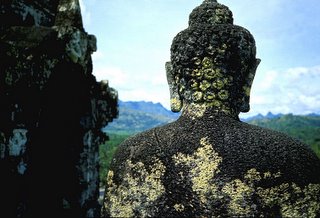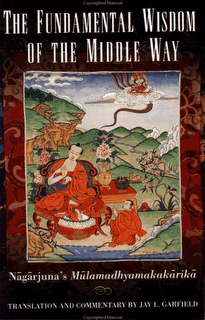
No, that's not a Zen altar; it's a Nichiren altar, and I'll come back to it in a minute.
Every time I go to Atlanta for a sesshin, I come back with something from the discussions that stays with me. Last month it had to do with vegetarianism, and I'll get around to writing that one eventually (the insight was not about what we eat, but about how we live). Last weekend, it came in the form of a question or response during the hosshin or mondo session; it was pointed out by the abbot that Zen expressly disclaims that we can influence the "outside" world by our zazen. Obviously on some level the distinction between the outside world and ourselves breaks down, according to one's understanding, but all verbal statements must be taken in context. The point is, from within the duality, our goal in meditation is not to improve the circumstances of our lives, but to improve our ability to cope with them (insofar as the goal of zazen has any external referent at all, but bear with me).
In other words, if my car breaks down, no amount of zazen will get me a new car or get my old one fixed. And although the goal of zazen is not to improve my ability to cope with the situation, that is often the effect. Back in my days with the Nichiren Shoshu of what is now the Soka Gakkai in the 1980's, the opposite attitude was encouraged. If you don't remember, the Nichiren people chant Nam-myo-renge-kyo (which is pretty much, devotion to the title of the Lotus Sutra), believing that they can reach enlightenment thereby. But not just enlightenment; newcomers are encouraged to chant for whatever it is they want, be it a new wife, a new job, etc. Believers are taught that by changing the karma from this life and past lives, by chanting the mantra, they can actually change the instant material conditions of their present.
I don't think I ever believed this, but I stayed with the practice for a couple of years because I did in fact receive benefits from the practice in terms of the effect it had on my lifestyle and on my insight. Part of this I'm still pretty sure came from the practice; even at my most cynical about the Nichirens, I would still say that any form of meditation practice is better than none. Part of it I'm also sure came from the fact that I was leading meetings and had to explain this stuff again and again, and I found a way to rationalize it all. In a way, the belief that one can dissolve the effects of one's karma instantaneously is akin to the concept of beginner's mind: I can start from scratch right here, right now, in this one timeless moment. It can be a useful concept (bad word) to get rid of mental baggage and be in the moment.
I won't go into all the rationalizations here, but some of them led to more useful (for me) concepts during the couple of good years I had after I quit the Nichirens, when a lot of the concepts which I thought were mine alone but I found again when I returned to Zen in 2004, were formed. What's pertinent was the thought that one could change one's world by religious practice, which is pretty much what's referred to in modern psychology and anthropology as "magical thinking." The best definition I could find without extensive effort on the internet (and I don't have a source to cite for it, so, sorry...) is:
1. The conviction of the individual that his or her thoughts, words, and actions, may in some manner cause or prevent outcomes in a way that defies the normal laws of cause and effect.2. A conviction that thinking equates with doing. Occurs in dreams in children, in primitive peoples, and in patients under a variety of conditions. Characterized by lack of realistic relationship between cause and effect.As if anyone actually knew what all the laws of cause and effect are! But it gets the point across. Most religions and a lot of other belief systems have this kind of thinking as part of their premise -- think Voodoo. It's also a very normal part of the individual development of a child's thinking. Avoidance of magical thinking is ultimately why I had to come back to Zen as part of my need to return to ritual (which I contend is necessary for mental health) without having to believe that gods are being invoked, etc.; it's ultimately why my brief flirtation with Tibetan Buddhism didn't last long. It's associated with the openness of Zen to open-minded modern science, which is pretty much unique, the attempt of the Dalai Lama to wrangle neuroscience into Buddhism notwithstanding.
Anyway, back to Nichiren Shoshu. After chanting for a while, it was my perception that while external circumstances did sometimes oddly seem to change when a person started chanting (and yes, there are lots of real-world explanations for that one), more often the person started to conform to the world. In other words, my observation that was that after a period of practice, the goals one was chanting for seemed themselves to change. If a person started out chanting for a new car, whether or not he got the car, if he was still chanting a year later, mostly likely he was now chanting for understanding, or some other attainable goal which did not require magical thinking.
I still maintain that the chanting of Nam-myoho-renge-kyo was a beneficial practice for me; it changed my life in a very positive way, and it was the bullshit associated with the rest of the practiced and the organization of the Soka Gakkai that drove me out. But after a couple of years, and explaining the practice to myself and to others (in a very unorthodox way, I may add), the context in which I was doing the chanting was a lot different than where I started, and very different from where the beginners were told to start. And in fact, the organization itself, once you got to a certain level in the heirarchy or in experience, would admit that all the promises about material benefits made to beginners were just the lure; that the practice itself was bound to change the person and deepen his understanding. And from my experience, those whose understanding didn't grow weren't around long.
I'm a big fan of science fiction and fantasy, and I love well-written stuff about magic. I just don't believe in it in real life. Or I try not to, but it's a real danger I have to avoid every day. But consider: in a deeper sense, you and the universe are the same, so does not the change in yourself change the universe? Undeniably, it does. No matter how deep our understanding becomes, when we return to the realm of discourse and rational thought, we cannot explain nor conceptualize the real working of cause and effect. Now, I think that there is a definite line of definition between magical thinking, or just plain wishful thinking, and where we can realistically expect the benefits of our practice, be it Zen or anything else, to take us. But sitting here at this keyboard, just how to define that line eludes me, as perhaps it should.



